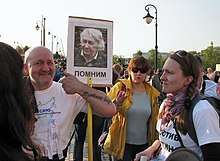Marina Salye
Marina Yevgenyevna Salye (Russian: Мари́на Евге́ньевна Салье́; 19 October 1934 – 21 March 2012) was a Russian geologist and politician, being the former deputy of the legislative assembly of Leningrad (renamed St. Petersburg on September 6, 1991). She was also a people's deputy in the Congress of People's Deputies of the RSFSR until September 1993, when the congress was dissolved. Salye was one of the leaders of the radical pro-reform group called Radical Democrats.[1]
Marina Yevgenyevna Salye Марина Салье | |
|---|---|
 A portrait of Marina Salye during the 2012 Protests after the 2011 Russian elections | |
| Personal details | |
| Born | 19 October 1934 Leningrad, Soviet Union |
| Died | 21 March 2012 (aged 77) Pskov Oblast, Russia |
Salye was an engaging leader and accused Vladimir Putin of corruption during her tenure with the Leningrad City Council in the mid-1990s.[2] In March 2010 Salye signed the online anti-Putin manifesto of the Russian opposition "Putin must go".[3] Shortly before her death in March 2012, she had also joined the People's Freedom Party.[4][5] She claimed that the years 1990-93 Lensovet members found that Vladimir Churov, head of the Russian election committee, and Igor Artemyev, head of the Antimonopoly service, worked for the KGB.[6]
Early life
Salye was born into a distinguished St. Petersburg family, and her great-great-grandfather was a watchmaker to the tsar. She earned a doctorate of geology and became a research scientist at Leningrad's Institute of Geology until 1990. She studied rocks across the Soviet Union, but during Mikhail Gorbachev's attempted political openness, glasnost in the late 1980s, Salye rose as a leader of a new group of democratic activists.[7]
Political career
In 1992, Marina Salye headed a special commission in St. Petersburg, which found that on the basis of documents signed by Vladimir Putin, then chairman of the city's Foreign Relations Committee, and his deputy, the city had exported rare earth metals, oil products and other raw materials for over 100 million dollars. These were barter contracts. In return, the city, where there were food shortages, should have received deliveries of foodstuffs, but the foodstuffs never materialised.[8] Salye suspected that Putin and his deputy had granted the export permits to companies that disappeared after receiving the materials. Putin denied that he did anything wrong and that the companies were to blame. Salye began an inquiry into the misappropriation that was approved by the city council for prosecutors to investigate Putin. The investigation was stopped by the mayor, Anatoly Sobchak who was a mentor of Putin.[9]
After the investigation was dismissed, Salye concentrated her efforts to liberal causes and founded the Free Democratic Party of Russia. She continued to criticize Putin in the mass media until 2000, when he was elected president. Then she moved to a remote village and did not speak to journalists for 10 years.[10] The village was located in the Pskov region and she rarely returned to St. Petersburg. It is speculated that she assumed the traditions of a Russian rural exile. In interviews, Salye feared Putins's power and friend's mysterious deaths.[11]
In March 2010 she gave an interview to Radio Liberty. Over time she had written memoirs and completed a large portion of them. The memoirs are based on an archive of documents containing illegal decisions of the city administration including Vladimir Putin.[12]
Personal life
Marina Salye was well known to have lived with a female partner whom she called her "sister." Her partner followed Salye to exile shortly after Putin's first election to the presidency in 2000.[13]
Honours and awards
- Jubilee Medal "50 Years of Victory in the Great Patriotic War 1941-1945"
- Jubilee Medal "60 Years of Victory in the Great Patriotic War 1941-1945"
- Jubilee Medal "65 Years of Victory in the Great Patriotic War 1941-1945"
- Medal "In Commemoration of the 300th Anniversary of Saint Petersburg"
- Medal "In Commemoration of the 250th Anniversary of Leningrad"
- Commemorative decoration "Citizen of the siege of Leningrad"
References and notes
- Hutchins, Chris, and Alexander Korobko. Putin. Leicester: Matador, 2012. 81-82. Print.
- Harding, Luke (March 28, 2012). "Marina Salye Obituary, Russian democrat and implacable opponent of Putin". The Guardian.
- "Sal'ye Commission Documents." Miami University, College of Arts and Science. Havighurst Center, Russian and Post-Soviet Studies, n.d. Web. 05 Dec. 2014.
- RFE/RL's Russian Service (2010-03-07). "Prominent Putin Critic Dies At 77". Rferl.org. Retrieved 2012-03-22.
- Умерла разоблачительница Путина Марина Салье
- Становление оппозиции — наш гражданский долг, Марина Салье, Радио Свобода, 7 января 2012 г.
- Harding, Luke (March 28, 2012). "Marina Salye Obituary, Russian democrat and implacable opponent of Putin". The Guardian.
- (Hutchins and Korobko 82)
- Kramer, Andrew (March 23, 2012). "Marina Salye, Politician Who Tried to Prosecute Putin, Dies at 77". The New York Times.
- "Putin foe speaks out from rural self-exile". Los Angeles Times. March 21, 2010.
- Kramer, Andrew (March 23, 2012). "Marina Salye, Politician Who Tried to Prosecute Putin, Dies at 77". The New York Times.
- Почему Марина Салье молчала о Путине 10 лет?
- Gessen, Masha (March 1, 2012). The Man Without a Face: The Unlikely Rise of Vladimir Putin. Riverhead Books; Reprint edition. ISBN 978-1594486517.
External links
| Wikimedia Commons has media related to Marina Salye. |
- Biography
- Biography (in Russian)
- Почему Марина Салье молчала о Путине 10 лет? Interview to Radio Liberty in March 2010
- Интервью М.Салье на радио "Эхо Москвы", 28.01.2000 Interview to the radio "Ekho Moskvy" in January 2000